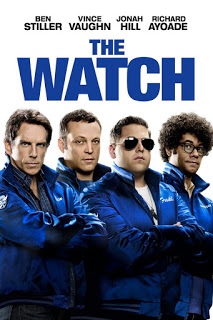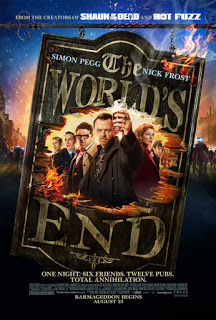It is difficult to avoid comparing The Watch (2012) without thinking about Edgar Wright’s The World’s End (2013). There is a similarity between these two films, much in the same way that Zombieland (2009) and Shaun of the Dead (2004) are similar but very dissimilar films (I previously compared those films in 2009). With their very close release dates, both films seem to have a almost symbiotic relationship with the zeitgeist of society.
There are spoilers ahead; these posts should be avoided for those who have not seen either film.
Let’s get this out of the way – while both films start with “normal” reality, both actually reveal that there’s a covert alien invasion that has largely already taken place before the films begin.
This is really where the two films diverge
Of course, you do have the expected differences between British and American comedies. The American comedy is far more reliant upon gross out humor, a bit of awkwardness around gender identity and sexual orientation, and the like.
But that is not the most fundamental difference between these two films.
Ultimately, The World’s End is about a band of brothers – once inseparable, then diverged by life, and briefly brought back together again by sheer force of will. But as the film unfolds, the friends slowly become parted again. Their ways of life have taken them in different directions, no matter how much you may wish to recapture that initial camaraderie. By the end of the film all of the main characters are very different places, both emotionally, physically, and sometimes whether or not they’re living or not.
In contrast, The Watch starts with off with a bunch of hapless losers who we are invited to make fun of. They’re held up as losers, misfits, bad fathers, and incompetent husbands. Over the course of the film we see these individuals become a team, face their individual fears and weaknesses and to come together. There is a happy ending of fusion, where society has been literally formed under adversity, inspiring everyone into an amalgam of rapport and common understanding. The father reconciles with his daughter (though with a very sex-negative message), the husband comes clean with his wife and saves his marriage, an alien realizes what’s important (er…interspecies sex?), and the misfit rejected cop is recognized as better than the (er….incompetent) existent police force.
This is so starkly different than the end of The World’s End, that I think it highlights the differences between both the sensibilities of American and English filmmakers and filmgoers.
That is not to say that either of these films is bad. Both films are enjoyable in their own right. If you do not mind the gross-out humor (and a few “I’ll do gay things if I have to” so-called jokes) or off-color jokes that pepper The Watch, I’d recommend watching both movies to see firsthand the differences in approach to humor. For writers especially, seeing how different people handle similar material is a great way to really learn about the craft.
What these films say about our sensibilities as filmgoers, as Englishman, as Americans I leave as an exercise to the reader.



Did I ever tell you about my grand, overarching theory of the Cornetto trilogy (+Spaced)?
You have not; I look forward to hearing it!